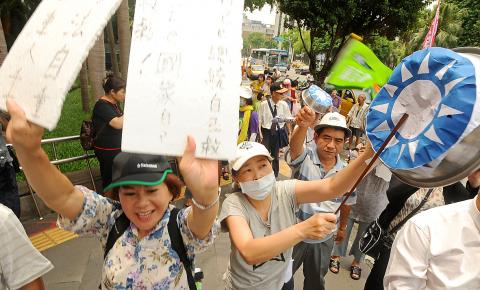A group made up of 26 civic organizations yesterday sued the Supreme Prosecutors’ Office Special Investigation Panel (SIP), accusing it of forging documents, subornation of perjury and abuse of judicial power.
Led by Taiwanese National Party (TNP) Chairman Huang Hua (黃華), the groups filed the lawsuit with the Taipei District Court against the SIP, which they said cut a deal with former -Chinatrust -Financial Holding Co (中信金控) vice chairman Jeffrey Koo Jr (辜仲諒) to testify against former president Chen Shui-bian (陳水扁) in an attempt to imprison him.
Koo, who was involved in a scandal over Chinatrust’s bid for rival Mega Financial Holdings Co (兆豐金控) — known as the Red Fire Case (紅火案), after the name of the offshore company used to conduct the illegal transaction — returned to Taiwan in 2008 after evading an arrest warrant and hiding in Japan for two years.

Photo: Liu Hsin-de, Taipei Times
The banker testified at the time that he had donated about NT$300 million (US$10.4 million) of his illegal profits to Chen, currently serving a 17-and-a-half-year term for corruption and money laundering, as a kickback.
Koo’s lawyers told the Taiwan High Court in May that Koo did not remit the money to Chen, adding that he testified out of fear of being detained upon his return to Taiwan.
Koo was released on bail after returning from Japan and was sentenced to nine years in prison in October last year.
The SIP, including former prosecutor Yueh Fang-ju (越方如) who flew to Japan to persuade Koo to return, is suspected of coercing Koo to commit perjury, Huang said.
Despite the SIP’s conclusion on July 4 that no prosecutor had abused his power in the Chen case, the civic groups decided to file the lawsuit in the interest of upholding social justice and human rights, he said.
The groups also said former president Lee Teng-hui’s (李登輝) recent indictment on charges of embezzling state funds was a “similar act of oppression against Taiwanese.”
The Lee and Chen cases were both acts of “political oppression,” Huang said.
Dozens of members of the groups chanted slogans calling for “judicial reform” and saying “Taiwanese are innocent” in front of the court.
They also urged the establishment of a jury system.

MORE VISITORS: The Tourism Administration said that it is seeing positive prospects in its efforts to expand the tourism market in North America and Europe Taiwan has been ranked as the cheapest place in the world to travel to this year, based on a list recommended by NerdWallet. The San Francisco-based personal finance company said that Taiwan topped the list of 16 nations it chose for budget travelers because US tourists do not need visas and travelers can easily have a good meal for less than US$10. A bus ride in Taipei costs just under US$0.50, while subway rides start at US$0.60, the firm said, adding that public transportation in Taiwan is easy to navigate. The firm also called Taiwan a “food lover’s paradise,” citing inexpensive breakfast stalls

TRADE: A mandatory declaration of origin for manufactured goods bound for the US is to take effect on May 7 to block China from exploiting Taiwan’s trade channels All products manufactured in Taiwan and exported to the US must include a signed declaration of origin starting on May 7, the Bureau of Foreign Trade announced yesterday. US President Donald Trump on April 2 imposed a 32 percent tariff on imports from Taiwan, but one week later announced a 90-day pause on its implementation. However, a universal 10 percent tariff was immediately applied to most imports from around the world. On April 12, the Trump administration further exempted computers, smartphones and semiconductors from the new tariffs. In response, President William Lai’s (賴清德) administration has introduced a series of countermeasures to support affected

CROSS-STRAIT: The vast majority of Taiwanese support maintaining the ‘status quo,’ while concern is rising about Beijing’s influence operations More than eight out of 10 Taiwanese reject Beijing’s “one country, two systems” framework for cross-strait relations, according to a survey released by the Mainland Affairs Council (MAC) on Thursday. The MAC’s latest quarterly survey found that 84.4 percent of respondents opposed Beijing’s “one country, two systems” formula for handling cross-strait relations — a figure consistent with past polling. Over the past three years, opposition to the framework has remained high, ranging from a low of 83.6 percent in April 2023 to a peak of 89.6 percent in April last year. In the most recent poll, 82.5 percent also rejected China’s

PLUGGING HOLES: The amendments would bring the legislation in line with systems found in other countries such as Japan and the US, Legislator Chen Kuan-ting said Democratic Progressive Party (DPP) Legislator Chen Kuan-ting (陳冠廷) has proposed amending national security legislation amid a spate of espionage cases. Potential gaps in security vetting procedures for personnel with access to sensitive information prompted him to propose the amendments, which would introduce changes to Article 14 of the Classified National Security Information Protection Act (國家機密保護法), Chen said yesterday. The proposal, which aims to enhance interagency vetting procedures and reduce the risk of classified information leaks, would establish a comprehensive security clearance system in Taiwan, he said. The amendment would require character and loyalty checks for civil servants and intelligence personnel prior to